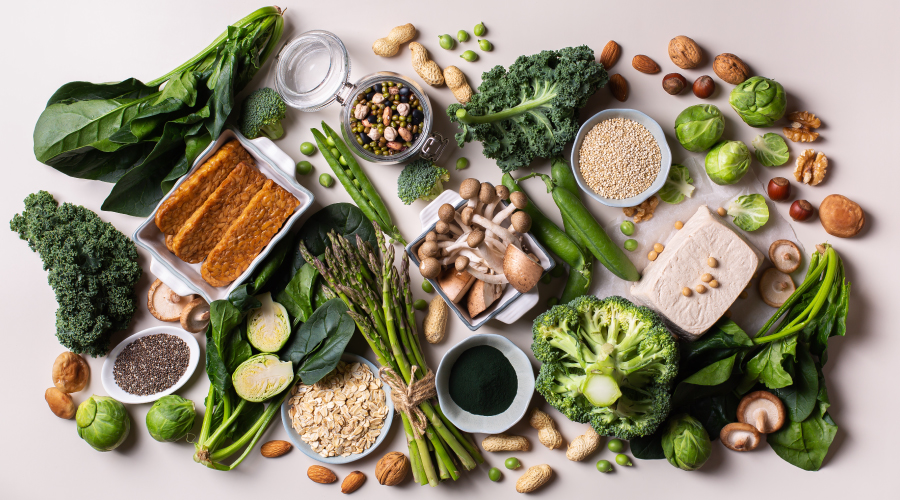In today’s health-conscious world, maintaining a balanced and nutrient-rich diet is essential, especially for vegetarians seeking to optimize their protein intake. Proteins are fundamental building blocks for the body, crucial for muscle repair, immune function, and overall vitality. For those adhering to a vegetarian diet, incorporating diverse sources of protein ensures not only meeting nutritional needs but also promoting long-term health benefits. Here, we explore a variety of high-protein foods that can enhance your well-being and support a thriving vegetarian lifestyle.
1. Lentils
Lentils are a staple in vegetarian diets worldwide, cherished for their high protein content and versatility in culinary applications. Packed with fiber, iron, and folate, lentils provide essential nutrients while promoting digestive health and cardiovascular wellness. Whether enjoyed in hearty soups, savory stews, or wholesome salads, lentils offer a satisfying and nutritious addition to any meal.
2. Quinoa
Quinoa, often hailed as a superfood, stands out as a complete protein source among plant-based foods. Rich in all nine essential amino acids, quinoa supports muscle growth and repair, making it an ideal choice for vegetarian athletes and fitness enthusiasts. Beyond its protein prowess, quinoa is also abundant in fiber, magnesium, and antioxidants, contributing to improved digestion and overall cellular health.
3. Chickpeas
Chickpeas, or garbanzo beans, are renowned for their robust protein content and delightful nutty flavor. Packed with fiber, vitamins, and minerals such as folate and manganese, chickpeas promote satiety and regulate blood sugar levels. Whether roasted for a crunchy snack, blended into creamy hummus, or incorporated into flavorful curries, chickpeas offer a nutrient-dense boost to vegetarian diets.
4. Tofu
Tofu, derived from soybeans, remains a versatile and protein-rich staple in vegetarian cuisine. As a complete protein source, tofu provides all essential amino acids necessary for optimal bodily function. Additionally, tofu is rich in calcium, iron, and magnesium, supporting bone health and metabolic processes. Whether grilled, stir-fried, or blended into smoothies, tofu offers endless possibilities for creating savory and nutritious dishes.
5. Greek Yogurt
Greek yogurt stands out among dairy products for its elevated protein content and probiotic benefits. With double the protein content of regular yogurt, Greek yogurt supports muscle recovery and digestive health. Rich in calcium and B vitamins, Greek yogurt serves as an excellent breakfast option, snack, or ingredient in smoothies and baked goods, contributing to a balanced and nourishing diet.
6. Seeds (Chia, Hemp, Flax)
Seeds such as chia, hemp, and flaxseed provide concentrated doses of protein, healthy fats, and essential nutrients. Rich in omega-3 fatty acids and antioxidants, seeds promote heart health and reduce inflammation. Whether sprinkled atop salads, blended into nutrient-packed smoothies, or incorporated into baked goods, seeds offer a convenient and versatile means of boosting protein intake for vegetarians.
7. Edamame
Edamame, young soybeans harvested before maturation, serve as a protein-rich snack or culinary ingredient. Loaded with fiber, vitamins (including vitamin K and folate), and minerals, edamame supports immune function and bone health. Whether enjoyed steamed as a snack or added to salads and stir-fries, edamame provides a wholesome and protein-packed addition to vegetarian diets.
8. Nuts and Nut Butters
Nuts such as almonds, peanuts, and cashews, along with their respective nut butters, offer substantial protein content alongside healthy fats and essential nutrients. Rich in vitamin E, magnesium, and antioxidants, nuts promote cardiovascular health and cognitive function. Whether enjoyed as a convenient snack, sprinkled atop yogurt, or blended into creamy nut butters, nuts provide sustained energy and nutritional benefits for vegetarians.
9. Green Peas
Green peas, a humble yet nutritious legume, boast notable protein content and essential vitamins and minerals. High in fiber, vitamin C, and vitamin K, green peas support digestive health and immune function. Whether incorporated into soups, mixed into salads, or enjoyed as a standalone side dish, green peas offer a nutrient-dense addition to vegetarian diets, promoting overall well-being and vitality.
10. Soy Milk
Soy milk serves as a dairy-free alternative rich in protein, calcium, and essential vitamins (such as vitamin D). With its creamy texture and mild flavor, soy milk serves as a versatile ingredient in beverages, cereals, and baked goods. As a source of complete protein, soy milk supports muscle maintenance and overall bone health, making it an optimal choice for lactose-intolerant individuals and vegetarians alike.
Practical Tips for Incorporating High-Protein Foods into Your Diet:
- Diverse Meal Planning: Embrace variety by incorporating a spectrum of protein-rich foods into daily meals and snacks.
- Nutrient-Rich Snacking: Keep protein-packed snacks like nuts, seeds, or yogurt readily available for convenient and wholesome snacking.
- Creative Cooking: Experiment with recipes that highlight plant-based proteins, from savory main courses to decadent desserts.
- Balanced Nutrition: Pair protein-rich foods with whole grains, vegetables, and healthy fats to optimize nutrient absorption and support overall health.

